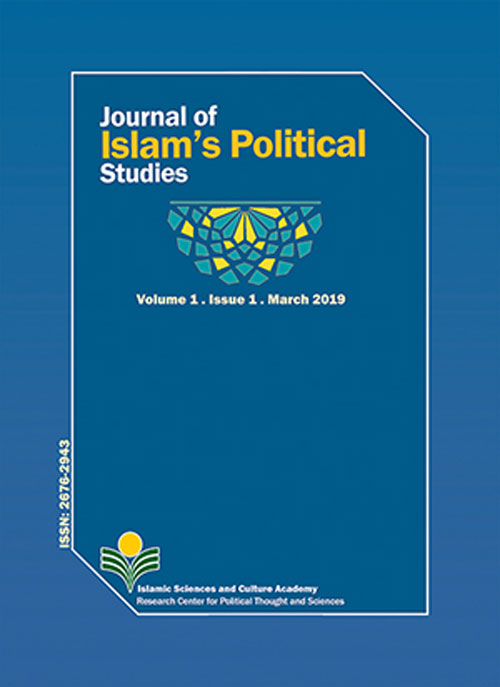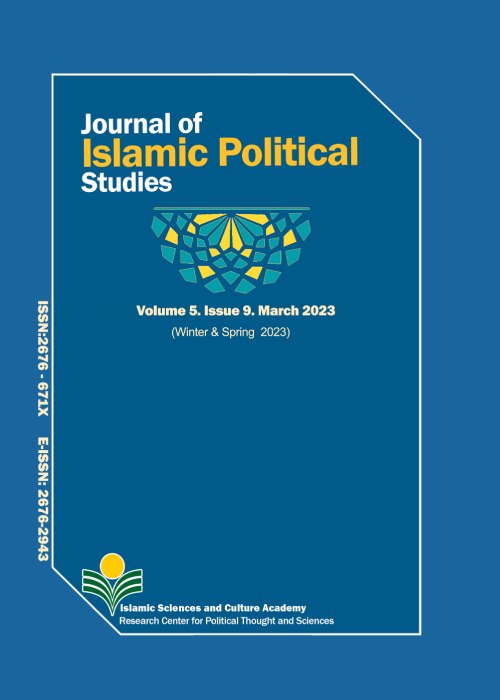فهرست مطالب

Journal of Islamic Political Studies
Volume:1 Issue: 1, Winter-Spring 2019
- تاریخ انتشار: 1397/12/10
- تعداد عناوین: 7
-
Pages 7-23Almost two decades after the advent of the Revolution and the system of the Islamic Republic, the model of “Religious Democracy” was introduced. It resulted in various scientific issues and dialogues about the concept of “religious democracy,” its potentials, limitations, pillars, and institutions. Therefore, in the present article, the discourse formation of religious democracy is presented with a brief look at its concept. In accordance with the author, religious democracy is a conception of democracy that recognizes the collective power and people’s participation as the essence of democracy, and also justifies, analyzes, and explains that referring to religion and its principles. According to a methodological study of discursive analysis, in religious democracy, “religion” and according to its Iranian discourse, “Islam” is regarded as nodal points. The main floating signifiers of Religious Democracy in the Iranian discourse are ”People”, “Law”, “Political Equality”, “Freedom”, “Independence”. The meaning of these signifiers will be understood by referring to Islam as the nodal point of the Religious Democracy. Nowadays in Iran, this kind of Democracy is exercised, and it seems that the most important “strategic and political necessity” for Islamic countries is exercising the “Religious Democracy” of their own.Keywords: Religious Democracy, Political Equality, Discursive Analysis
-
Pages 24-46Political freedom has faced internal and external barriers over time. This study aims to investigate external barriers to political freedom, approaching to Quran with the question that, what the external barriers to political freedom are that manifest themselves in the political and social arenas. It also stresses the assumption that the external barriers to political freedom must be observed within their oppressive scope with its specific principles, and counter forces to freedom, in addition to the internal barriers to political freedom. Those counter forces, which are regarded as freedom barriers include the Taghuts (Dictators), Mostakbers (arrogant rulers), aristocrats, the opulent, scholars. Hence, we set this question forth from the Quran: what the external barriers to human freedom are that often appear in political and social forms. Employing a local method of discretional interpretation and adopting a Quranic perspective, the study innovates in that it investigates external barriers to political freedom including the role of oppressive structure, fabricated rules together with the role of people and Taghuts.Keywords: Quran, Political freedom, Political structure, Taghut
-
Pages 47-72Political participation is seen as the backbone of a political state and an element ensuring the efficiency and reliability of a political system. Political participation varies according to every reading of political system, approach, contraction and expansion, as difference in the genre and scope of political participation in these systems is consistent with the principles and structure of that political order. This research investigates three genres of a democratic order used in Islamic nations'' namely new caliphate, constitutional monarchy, and religious democracy. Consistent with the queries about the political participation capacities of a religious democratic system, the paper, based on a descriptive, analytical, comparative, and critical method, maintains that political participation in this political order profits from a wider scope and capacity, plus the reliance on religious principles; and it also can ensure a desirable supervision of agents as well as the efficiency of the political system, in addition to providing a pervasive political participation between the elites and the masses. It can also be introduced as a political order, which is an alternative to democracy in the modern world.Keywords: Political Participation, democracy, New Caliphate, Constitutional Monarchy, Religious Democracy, Political System
-
Pages 73-89Undoubtedly, Avicenna is one of the most outstanding intellectual and cultural characters in the Islamic civilization. Though the stand of Avicenna is somehow clear in areas such as metaphysics, natural sciences, logic and other disciplines, there is little consent regarding his political philosophy. The present study aims to observe his reflections on politics from a new perspective, i.e. studying Avicenna’s political thought in the context of his oriental (or eastern) philosophy. To do so, the paper demonstrated that instead of following Peripatetic philosophers who regard politics as a subcategory of practical wisdom, he intended to derive his political thought under the subjects of prophethood. This was the reason that the subjects such as speculation (Hads) and imagination in Avicenna’s political philosophy drew significant attention. Hence, we can say that in his extensive framework the political philosophy is converted from a rational-civic knowledge to a cosmic imagination-based wisdom. From this perspective, we can assume that not only he was the precursor of Sohravardi but also influenced a significant portion of Iranian intellectual history based on a unique system of wisdom.Keywords: political philosophy, Iranian Philosophy, Imagination, Oriental Wisdom, Avicenna
-
Pages 90-109Is it possible to use transcendental theosophy and the fundamental doctrine of Existentialism for the sake of political science? If Philosophy is to be a basis for the guidance of political science, then how is it possible for transcendental theosophy to carry out this crucial task? The present paper aims to explore how political science uses transcendental theosophy’s doctrines. The claims that we cannot utilize transcendental theosophy’s doctrines directly in political science. However, transcendental theosophy can provide philosophical models of political Science. The way of exploring this claim is a documentary method with comparison and contrast. Its results can be utilized to specify how Political Science uses transcendental theosophy, Political Theorizing, and Philosophical Epistemology. The results can be used to specify the relations between knowledge and excellence as well as between theoretical wisdom and practical wisdom. It is useful on the structure of Knowledge in Humanities and the construction of Social Reality too. Is it possible to use transcendental theosophy and the fundamental doctrine of Existentialism for the sake of political science? If Philosophy is to be a basis for the guidance of political science, then how is it possible for transcendental theosophy to carry out this crucial task? The present paper aims to explore how political science uses transcendental theosophy’s doctrines. The claims that we cannot utilize transcendental theosophy’s doctrines directly in political science. However, transcendental theosophy can provide philosophical models of political Science. The way of exploring this claim is a documentary method with comparison and contrast. Its results can be utilized to specify how Political Science uses transcendental theosophy, Political Theorizing, and Philosophical Epistemology. The results can be used to specify the relations between knowledge and excellence as well as between theoretical wisdom and practical wisdom. It is useful on the structure of Knowledge in Humanities and the construction of Social Reality too.Keywords: Political Science, Transcendental Theosophy, Philosophical Epistemology, Theorizing, practical wisdom, Structure of Knowledge in Humanities
-
Pages 110-132The concept of expediency is an important and common concept in the history of political thought. Viewing the political legacy remained from ancient Iran and drawing an analogy of which with the literary works remained from the Islamic era, one can perceive that “expediency of the kingdom” is a central concept in the Iranian political thought. Also in the Islamic era and by translation of Iranian works, this concept was reflected in Siyasatnama which resulted in expediency-based politics. Given the history of Iranian political thought, the present article investigates the place and the role of this concept by giving an account of it. The results of the study indicate that in Iranian thought, expediency of the kingdom is not an abstract concept and can be applied to anything that has contributed to the development of the kingdom, spreading of knowledge, increasing the power and credibility and stability of the state.Keywords: Iran, Political thought, Kingdom, Expediency
-
Pages 133-152The category of justice and fair governance is one of the crucial issues in the history of thought and political philosophy. The point is important in Iranian-Islamic thought as well. The present paper has raised the question of what the founding principles of fair governance are through the normative and Life-World theory. We can discuss the existence of an Iranian-Islamic justice pattern within the framework of Life-World culture in the shadow of contemporary era necessities. In an address to this hypothesis, the author has argued that, by forming a combination of the world life, Iranian and Islamic dimension, and one can either correct the problems of governance or present a broader idea of that, defined on three axes. The pattern in question owes three historical-theoretical components: Iranshahri political thought and justice, justice in Imam Ali's outlook, and Imam Khomeini's justice-seeking theory realized in the context of the Islamic Revolution discourse that acts as a roadmap in a turbulent world and satisfies the justice seekers in the Islamic Awakening. This article has been written in a descriptive-analytical method within the normative critical theory framework.Keywords: Justice, Iranian-Islamic Pattern, Imam Ali (PBUH), Iranshahri political thought, Imam Khomeini (PBUH)


